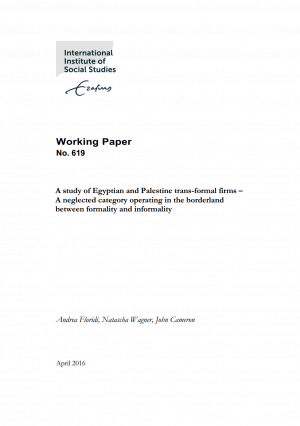
Policy highlights:
- This study identifies a third economy in addition to the formal and informal economies: the transformal economy. Firms falling within this sector can be identified by one or more of the following characteristics: officially registered, having an official bank account, and having an official balance sheet. They form the majority of firms in Egypt and Palestine.
- Transformal firms are also thought of as operating in a ‘borderland’, a space of ambiguity where the formal and informal economy interacts. Policies that focus on raising or lowering the borderline between the formal and informal economy, and on formalization, might be ineffective if they view firms as passive actors to be moved from one category to another.
- Transformal firms survive by building durable institutional relationships with customers, suppliers, similar firms, creditors and individual state officials. Implementing poverty alleviation policies alongside microcredit for transformal firms may be unattractive or lead to ineffective outcomes. Rather, policy should address specific potential that characterizes the borderland and the relevant actors.










